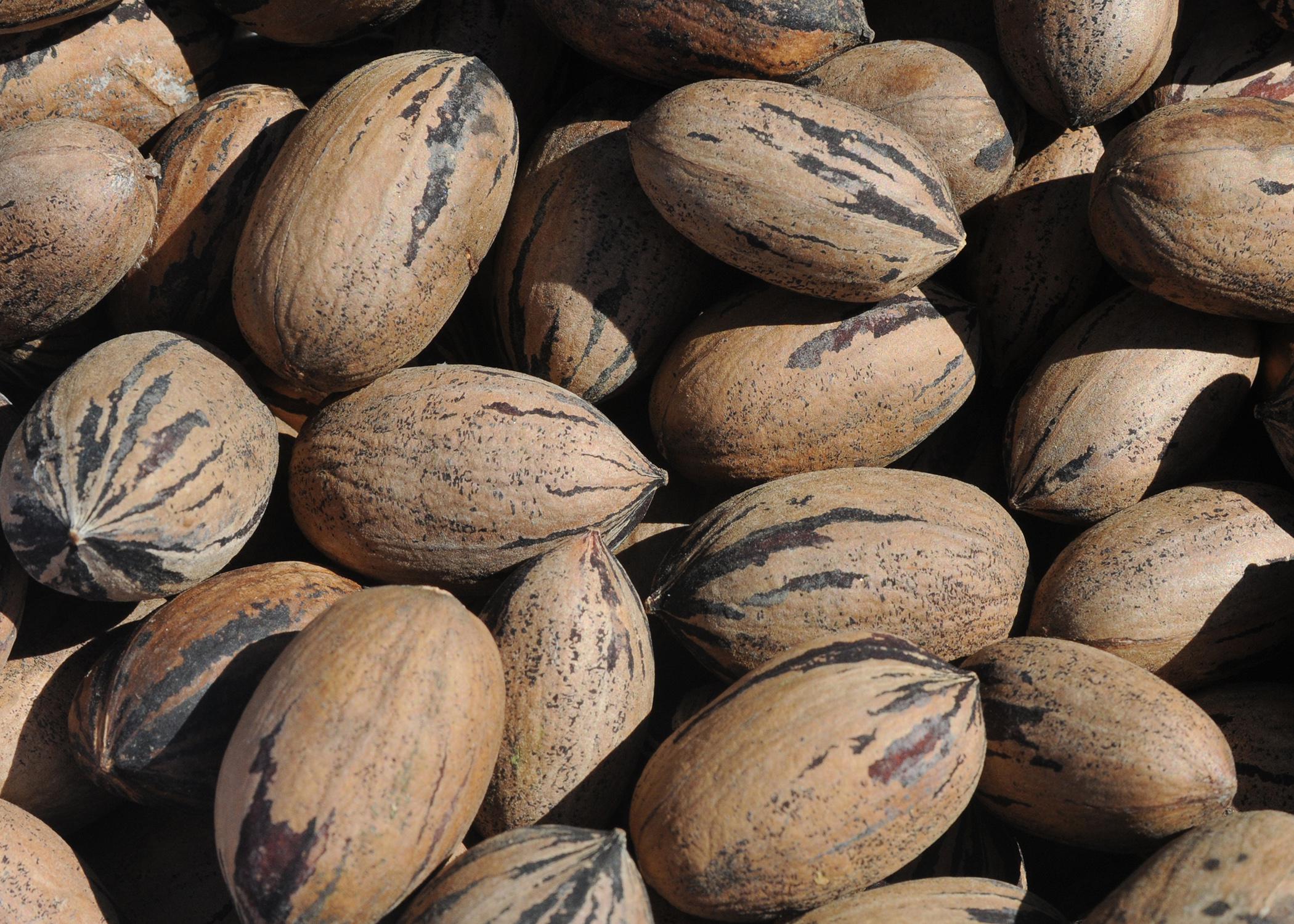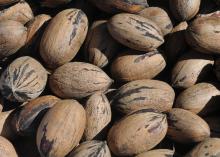State’s pecan crop at harvest after drought
STARKVILLE, Miss. -- Mississippi appears to have a decent-sized pecan crop this year, but quality may have been reduced by the dry summer.
James Callahan, president of the Mississippi Pecan Growers Association, said the organization estimates Mississippi has about 18,000 acres of pecans in production with 400 growers. The majority of the state’s pecans are in the Delta, and very few acres are irrigated.
Callahan, who owns Moon Lake Pecans in Coahoma County with his wife, Nancy, has 160 acres growing more than 1,100 pecan trees in seven varieties. He said the drought hurt pecan trees in the northern part of the state the most, as some other areas received timely rain.
“I’m hearing from some of the growers that they had a good crop, but some of the early varieties are having some quality problems because of the drought,” Callahan said.
Pecan harvest in Mississippi begins in late September and can last into late January in orchards with large, older trees that cannot be shaken to induce fruit drop. He said in addition to the Delta, the Hinds County area has a lot of pecans. South Mississippi today has very few.
“There used to be a lot of orchards in the south part of the state, but hurricanes took out the big orchards,” he said. “Now land is worth a lot more in development than in pecan orchards.”
This year’s pecan crop struggled with excessively dry weather for most of the summer.
Eric Stafne, fruit crop specialist with the Mississippi State University Extension Service, said drought leads to nut drop and prevents some remaining pecans from filling out properly.
“Dry periods during the summer can be detrimental to non-irrigated orchards by reducing fruit quality and not allowing the nuts to fill out fully,” Stafne said.
Although 2024 has been very dry, the drought of 2023 was worse.
“Some effects of drought are poor nuts, lack of yield, tree dieback, tree death, reduced return bloom, and weakened trees that lead to cold injury or disease and insect damage,” Stafne said. “These effects are mainly seen in non-irrigated orchards but could be present even in irrigated orchards if irrigation was insufficient to keep up with water demand.”
Other typical challenges for Mississippi pecans are pecan scab fungus, aphids, hickory shuckworm and pecan weevil. Growers use a variety of management practices to combat these insect or disease pressures.
“Recently I’ve seen some ambrosia beetle damage in an orchard,” Stafne said. “That isn’t extremely common, but it is something to keep an eye on as this pest is attracted to stressed trees.”
Mississippi growers produce several varieties of pecans, including Elliot, Stuart, Desirable, Kiowa, Forkert, Cape Fear, Excel, Sumner, Choctaw and Creek. Stafne said the state’s acreage is aging, but some new orchards are being established.
“I believe there is potential for industry growth if orchards are irrigated, pecan scab-resistant varieties are grown and mechanical management is employed,” he said. “Unfortunately, there isn’t a lot of infrastructure such as shelling and packing to support a larger pecan industry in Mississippi.”
Pecan prices vary by type and fluctuate annually.
Elizabeth Canales Medina, an Extension agricultural economist, said the U.S. Department of Agriculture reports that a 50-pound sack of improved pecans brought $167.36 in 2023, down from $170.93 in 2022 and up from $158.07 in 2021.
A 50-pound sack of native or seedling pecans brought $148 in 2023. Those same pecans were sold for $108.35 in 2022 and $106.18 in 2021.
“So far, prices this year seem a bit higher,” Canales said. “But with pecans, we see more sales later in the year, so there have not been enough data points yet to get a good feel for how prices will be this year, on average, compared to other years.”
She said pecan consumption has increased in recent years as people appreciate the health benefits of tree nuts.
“We have seen an increase in the use of pecans beyond snacks and holiday desserts,” Canales said. “They are now commonly used in nut butters and gluten-free and low-carb nut-based flours. These options are in high demand among individuals following specific diets -- like plant-based, keto, or low-carb -- because of pecans’ flavor and nutrient profile.”
Per capita pecan consumption increased from .35 pounds in 2012 to .61 pounds in 2021. Canales attributed this increase to shifting consumer preferences toward healthier food options, along with better marketing and promotion of pecans.




